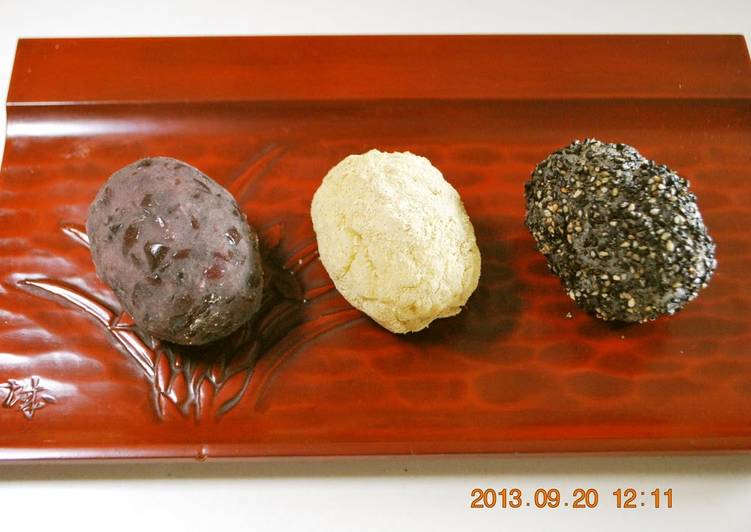Easy Ohagi (Rice and Sweet Bean Cakes) Made in Just 10 Minutes With a Microwave. Made with glutinous rice and red bean paste, these Japanese Sweet Rice Balls (Ohagi/Botamochi) are eaten during the spring and autumn equinoxes Ohagi or Botamochi is one of those special foods we enjoyed during spring and autumn equinoxes every year. They are sweet rice balls filled or coated. It is sticky rice ball coated with sweet red bean paste.
 This ohagi recipe provides instructions for making traditional Japanese desserts/sweets out of azuki red beans and mochi rice cakes.
Remove the pan from the rice cooker or hob, then while the rice is still warm sprinkle on a.
Ohagi, or botamochi, are sweet rice balls which are usually made with glutinous rice.
You can cook Easy Ohagi (Rice and Sweet Bean Cakes) Made in Just 10 Minutes With a Microwave using 7 ingredients and 15 steps. Here is how you achieve it.
This ohagi recipe provides instructions for making traditional Japanese desserts/sweets out of azuki red beans and mochi rice cakes.
Remove the pan from the rice cooker or hob, then while the rice is still warm sprinkle on a.
Ohagi, or botamochi, are sweet rice balls which are usually made with glutinous rice.
You can cook Easy Ohagi (Rice and Sweet Bean Cakes) Made in Just 10 Minutes With a Microwave using 7 ingredients and 15 steps. Here is how you achieve it.
Ingredients of Easy Ohagi (Rice and Sweet Bean Cakes) Made in Just 10 Minutes With a Microwave
- Prepare 200 ml of Mochi rice (sticky rice or sweet rice).
- Prepare 1 of the same amount as the rice Water.
- It's 300 grams of Store-bought ready-made anko (homemade is better).
- You need 1 tbsp of *Black sesame seeds.
- You need 1 tsp of *Sugar.
- Prepare 1 tbsp of ☆Kinako.
- You need 1 tsp of ☆Sugar.
Glutinous rice is a sticky, often sweet rice grown in Southeast Asia. It is called glutinous not because it contains gluten, but due to its stickiness. Mochi is a Japanese rice cake made from glutinous rice. Ohagi (Japanese Sweet Rice with Adzuki Paste).
Easy Ohagi (Rice and Sweet Bean Cakes) Made in Just 10 Minutes With a Microwave step by step
- Rinse the mochi rice, and put it into a microwaveable casserole dish (or similar) then add the water. Leave to soak for more than 30 minutes, an hour if possibe..
- Make six 10 g balls of anko. They don't have to be perfectly formed, as long as they are in lumps. (These are for the sesame seed and kinako versions.).
- Make three 40 g balls of anko. (These are for the anko versions.) For both sizes of anko balls, you only need to measure the first ones and then eyeball the rest to match in size..
- Combine the * sesame seeds and sugar and grind them up lightly. Combine the ☆ kinako and sugar, too..
- Cover the Step 1 mochi rice with a lid or plastic wrap and microwave for 6 minutes. Mix it up with a rice paddle, and microwave for an additional 4 minutes..
- When it has finished cooking in the microwave, cover with a tightly wrung out moistened kitchen towel and leave for 5 minutes..
- After 5 minutes, mash up the rich with a pestle. (You can buy a mortar and pestle at a 100 yen shop.).
- Moisten your hands and divide the mashed rice into three 30 g balls (for the anko version) and six 40 g lumps (for the sesame and kinako versions)..
- Form about 4 cm long rice balls. These are for the anko-coated ohagi, so there's no anko inside them..
- Flatten out a 40 g portion rice from Step 8 with moistened hands..
- Put an anko ball from Step 2 (10 g each) on top of the rice and form into a ball. Make 6 like this, and coat 3 in the sesame-sugar mix and 3 in the kinako-sugar mix made in Step 4. The sesame and kinako ohagi are done..
- To make the anko ohagi, spread out a 40 g anko ball (made in Step 3) and wrap it around the small rice ball you made in Step 8 from the bottom to the top..
- Spread out the anko so that the rice can't be seen anymore..
- Done. Arrange them with the nicer side facing up. Even some store-made ohagi have some of the rice peeking through, so ~.
- This is how the sesame seed and kinako ohagi look when cut..
Make rice balls for matcha ohagi. Place a piece of plastic wrap over a small bowl and place one piece of cooked. This fast and easy donut recipe is unusual because it's a mochi donut and it's made with sticky rice. However, Koreans still eat rice cakes on special days such as traditional holidays, birthdays, etc. Chapssaltteok (찹쌀떡) is a Korean dessert that is mainly made with sweet rice flour and red bean paste.